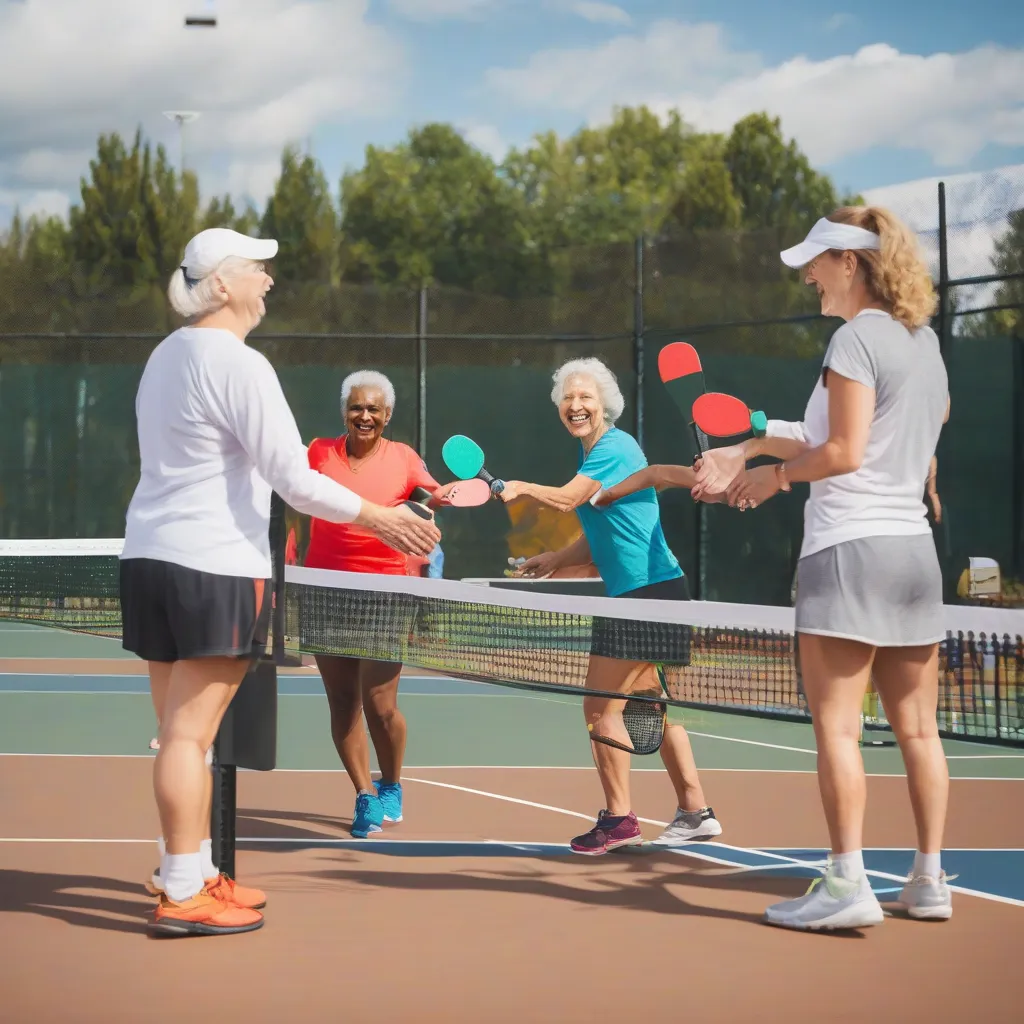Table of Contents
Introduction to Pickleball Etiquette
Pickleball is not only about skill and strategy but also about respect and sportsmanship. Understanding Pickleball etiquette is essential for creating a positive and enjoyable environment for all players. This beginner’s guide to Pickleball etiquette covers 10 important do’s and dont’s to ensure you behave appropriately on the court and contribute to a great playing experience for everyone. Mastering these etiquette tips will help you gain respect and build a good reputation in the Pickleball community.
Do: Respect the Rules and Regulations
Adhering to the official rules and regulations of Pickleball is fundamental. Familiarize yourself with the official Pickleball rules to ensure fair play. Respecting the rules demonstrates your commitment to the game and helps maintain order and fairness on the court. This is a key aspect of Pickleball etiquette.
 Pickleball Etiquette: Respecting the Rules
Pickleball Etiquette: Respecting the Rules
Don’t: Hog the Court
Pickleball courts are often in high demand, especially in public parks and community centers. Be mindful of others waiting to play and limit your court time during busy periods. Rotate off the court after your game to give others a chance to play. This consideration shows good sportsmanship and respect for fellow players, which is a crucial part of Pickleball etiquette.
Do: Communicate Clearly
Effective communication is vital in Pickleball, especially in doubles play. Call out the score before each serve and clearly announce “mine” or “yours” to avoid confusion during rallies. Good communication prevents misunderstandings and enhances teamwork. Practicing clear communication is a significant part of Pickleball etiquette.
Don’t: Distract or Interrupt
Avoid distracting or interrupting other players during their games. Refrain from loud conversations, movements, or other behaviors that can disrupt their focus. Wait until a rally is over before retrieving balls that have strayed onto their court. Respecting others’ concentration is an essential component of Pickleball etiquette.
Do: Acknowledge Good Play
Sportsmanship is a vital part of Pickleball. Acknowledge your opponent’s good shots with a nod or verbal praise. Congratulate them on their performance at the end of the game, regardless of the outcome. Positive reinforcement fosters a friendly atmosphere and demonstrates your respect for the game and its players. This is a key aspect of Pickleball etiquette.
Don’t: Argue Over Line Calls
Disputes over line calls can disrupt the game and create tension. If there’s a disagreement, give your opponent the benefit of the doubt and move on. Keep in mind that Pickleball is a game of honor, and maintaining a positive attitude is more important than a single point. Handling line calls gracefully is a crucial part of Pickleball etiquette.
Do: Be Punctual
Arrive on time for your games and practice sessions. Being punctual shows respect for your playing partners and ensures that games can start and finish as scheduled. If you’re running late, notify your partners as soon as possible. Punctuality is a simple yet important part of Pickleball etiquette.
Don’t: Use Excessive Force
Pickleball is a game of finesse and strategy rather than power. Avoid hitting the ball excessively hard, especially in social or recreational games. Using controlled and well-placed shots makes the game more enjoyable for everyone. Playing with consideration and control is a key element of Pickleball etiquette.
Do: Maintain a Positive Attitude
Pickleball is a fun and social sport. Keep a positive attitude, encourage your teammates, and enjoy the game. Avoid negative behaviors like complaining, criticizing, or showing frustration. A positive demeanor contributes to a pleasant playing environment and reflects well on you as a player. Maintaining positivity is an essential part of Pickleball etiquette.
Don’t: Leave Trash Behind
Always clean up after yourself. Dispose of water bottles, snack wrappers, and other trash properly. Leaving the court clean for the next players shows respect for the facility and the community. This simple act of responsibility is a fundamental part of Pickleball etiquette.
Resources for Further Learning
To continue improving your Pickleball skills and knowledge, check out these valuable resources:
Conclusion
By following these 10 essential do’s and dont’s, you’ll master the Pickleball etiquette needed for a positive and successful experience on the court. Remember to respect the rules, communicate clearly, and maintain a positive attitude. Your adherence to these etiquette guidelines will not only enhance your enjoyment of the game but also earn you respect and camaraderie among your fellow players. Implementing these Pickleball etiquette tips will set you on the path to success and enjoyment in this fantastic sport.
Frequently Asked Questions
- Why is Pickleball etiquette important? Pickleball etiquette ensures a respectful, enjoyable, and fair playing environment for all participants.
- What should I do if I disagree with a line call? Give your opponent the benefit of the doubt and move on to maintain a positive and respectful atmosphere.
- How can I improve communication with my partner? Use clear verbal cues and discuss strategies before the game to ensure effective teamwork.
- What are some ways to show good sportsmanship? Acknowledge good plays, congratulate opponents, and maintain a positive attitude throughout the game.
- Why is punctuality important in Pickleball? Being on time shows respect for your playing partners and ensures that games start and finish as scheduled.
- How can I avoid disrupting other players during their game? Wait until a rally is over before retrieving balls and avoid loud conversations or movements that can distract players.